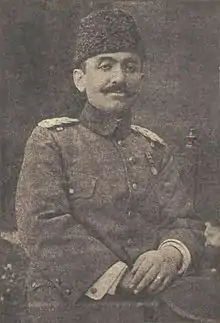Hafiz Hakki Pasha
Hafiz Hakki Pasha (Turkish: Hafız Hakkı Paşa, 24 April 1878, Edirne, Ottoman Empire – 15 February 1915; Erzurum), was an officer in the Ottoman Army who rose to the rank of Major General. He commanded troops during the Balkan Wars and the First World War.
 | |
| Born | 24 April 1878 Edirne, Ottoman Empire |
| Died | 15 February 1915 (aged 36) Erzurum, Ottoman Empire |
| Allegiance | |
| Service/ | |
| Years of service | 1901–1915 |
| Rank | Major general |
| Commands held | X Corps, Third Army |
| Battles/wars | Balkan Wars First World War |
| Spouse(s) | Behiye Sultan |
Career
Hafiz Hakki attended the Ottoman Military Academy, and graduated with Enver Pasha, Mahmud Kâmil Pasha, and Fahreddin Pasha. He finished second in his class (Fahreddin was first, Enver was fourth, Mahmud Kâmil was eighth) and also graduated from the Ottoman Military College first in his class (Enver was second, Mahmud Kâmil was fourth, Fahreddin was seventh) on 5 December 1902.[1] He was known as one of the "Freedom Heroes" in 1908.[2] Hafiz Hakki fought in the Balkan wars of 1912 and went on to write books about how armies should be led.
In World War I, Hakkı was one of the Ottoman commanders at the Battle of Sarikamish. As a colonel, Hakkı was placed in charge of X Corps along the Ottoman army's left flank. During this battle, the Ottoman army was utterly defeated by a much smaller Russian force. During the Ottoman retreat, their army was nearly annihilated, mostly due to extremely cold temperatures.
Personal life
On 17 February 1910 he married the Ottoman Princess Behiye Sultan, who was the eldest surviving daughter of Şehzade Mehmed Selaheddin, the son of Sultan Murad V.
Death
Hafız was appointed by Enver Pasha to take over the remnants of the Ottoman army in the Caucasus in early 1915. He went on to contract typhus, and ultimately died from the disease just a few weeks later, in the Turkish city of Erzerum.
Sources
- Harp Akademileri Komutanlığı, Harp Akademilerinin 120 Yılı, İstanbul, 1968, p. 27. (in Turkish)
- Erik Jan Zürcher, The Unionist factor: the Role of the Committee of Union and Progress in the Turkish National Movement, 1905-1926, BRILL, 1984, p. 47.